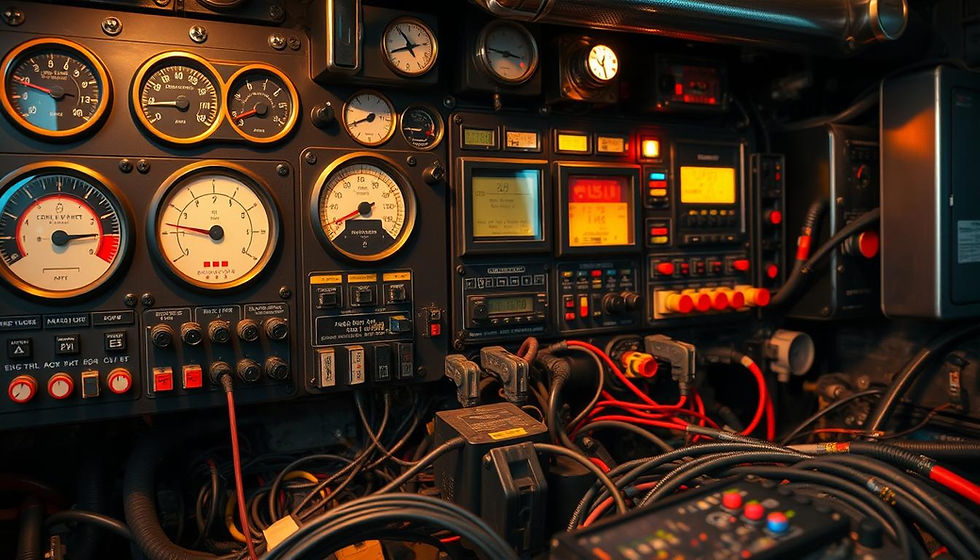How Can Heavy Equipment Repair Boost Your Business's Performance?
- alanthetruckrepair
- Jan 21, 2025
- 4 min read

When it comes to heavy equipment repair, businesses rely on expert solutions to keep their machines operating smoothly. From construction sites to warehouses, these powerful machines are critical for productivity. Regular maintenance and timely repairs are essential to ensure the longevity and efficiency of heavy equipment. In this blog, we'll explore the importance of heavy equipment repair. Everyday issues that require attention, and tips for keeping your machinery in top condition.
The Significance of Heavy Equipment Repair
Heavy equipment repair is more than just fixing problems. It's about maintaining the functionality and reliability of your machinery. Regular inspections and repairs can prevent costly breakdowns and downtime. Significantly impacting your business operations. Whether it's a bulldozer, excavator, or crane. These machines are vital assets, and their upkeep should always be noticed.
Common Issues in Heavy Equipment
Heavy equipment is subjected to intense wear and tear, leading to various issues. Some common problems include hydraulic failures, engine breakdowns, transmission issues, and electrical faults. Understanding these problems can help operators and owners recognize when their machines need attention.
Hydraulic Failures
Hydraulic systems are critical in heavy equipment. Issues such as leaks, contaminated fluids, or failing pumps can lead to reduced performance or complete system failure. Regular checks on hydraulic components, like hoses, filters, and seals, are crucial to prevent these problems.
Engine Breakdowns
The engine is the heart of any heavy equipment. Overheating, lack of lubrication, and wear and tear on internal components can cause severe damage. Regular maintenance, such as oil changes and air filter replacements. It can help avoid unexpected engine problems.
Transmission Issues
Transmission problems are common in heavy equipment. Ranging from minor adjustments to complete overhauls. Signs of transmission issues include slipping gears, unusual noises, or difficulty in shifting. These symptoms should not be ignored, as they can lead to costly repairs if left unattended.
Tips for Effective Heavy Equipment Repair and Maintenance
To minimize downtime and keep your heavy equipment operating efficiently, follow these maintenance tips:
Regular Inspections
Performing regular inspections can help detect issues before they become significant problems. Check for leaks, listen for unusual noises, and monitor fluid levels. A proactive approach can save you from unexpected breakdowns.
Establish a Maintenance Schedule
Create a maintenance schedule for your equipment. This schedule should include regular checks on components like filters, belts, and hydraulic systems. Following a set routine ensures that every maintenance task is noticed.
Training for Operators
Proper operator training is essential for the safe and effective use of heavy equipment. Trained operators can prevent misuse that might lead to unnecessary wear and tear. They should be familiar with the machine's manual and know how to perform basic maintenance tasks.
Use Quality Parts and Fluids
Always use high-quality parts and fluids for repairs and maintenance. Substandard parts can cause more harm than good, leading to frequent breakdowns. Opt for parts and fluids the equipment manufacturer recommends. To ensure compatibility and reliability.
Prompt Repairs
When problems arise, address them promptly. Ignoring signs of damage can lead to more extensive and costly repairs in the future. Contact a professional for timely heavy equipment repair to prevent the situation from worsening.
Benefits of Regular Heavy Equipment Repair
Regular heavy equipment repair not only extends the lifespan of your machinery but also improves safety and operational efficiency. Well-maintained machines are less likely to break down on-site, reducing the risk of accidents and downtime. They also perform better, providing consistent power and performance throughout their operational life.
Increased Lifespan
Proper maintenance ensures that your heavy equipment lasts longer. Regular checks and repairs can prevent the wear and tear that leads to premature breakdowns. Resulting in a higher return on investment for your equipment.
Reduced Downtime
Downtime is costly in terms of lost productivity. Keeping your machines in optimal condition minimizes the risk of unexpected breakdowns that can halt operations. Regular maintenance catches minor issues before they become significant problems.
Improved Safety
Regular heavy equipment repair ensures that your machines are safe to operate. Faulty equipment can lead to accidents, causing injury or even fatality. Keeping machinery in good repair is crucial for the safety of operators and workers on-site.
Investing in heavy equipment repair is not just necessary. It's a strategic decision for any business that relies on machinery to operate efficiently. Regular maintenance and timely repairs are critical to running your heavy equipment smoothly and preventing unexpected downtime. A proactive approach to heavy equipment repair can save you money in the long run by extending the lifespan of your machinery. Enhancing operational efficiency, and ensuring the safety of your workers.
By understanding the common issues affecting heavy equipment, such as hydraulic failures, engine breakdowns, and transmission problems. You can address these concerns before they escalate into costly repairs. Regular inspections, following a maintenance schedule, and using high-quality parts and fluids are essential practices that prevent minor issues from becoming major problems. Training operators on proper use and maintenance procedures can also minimize wear and tear, reducing the risk of breakdowns.
Moreover, ensuring that your heavy equipment is in top condition enhances safety on the job site, protecting your employees and avoiding accidents that could result in injuries or downtime.
Taking a proactive approach to heavy equipment repair is crucial for the success of any business that depends on heavy machinery. Regular maintenance and prompt repairs not only extend your equipment's life but also improve your operations' safety, efficiency, and profitability. By investing in the proper maintenance practices and partnering with a trusted repair service, you can keep your heavy equipment in peak condition. Reduce operational costs, and ensure the longevity of your business. Don't wait for problems to occur—act now to maintain the health and performance of your machinery and secure the future of your business.





Comments